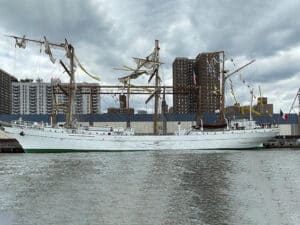
Canadian university to convert ship to fuel cell hybrid research vessel
Written by A former Canadian Coast Guard cutter is to be converted into North America’s first ever hybrid, electric research ship. BMT Fleet Technology, of Ottawa, Ontario is collaborating with the University of Victoria, British Columbia, to refit the former Tsekoa II for ocean research in the Strait of Georgia and off the west coast of Vancouver Island. Funding of over $10 million has been provided by the Canada Foundation for Innovation, the BC Knowledge Development Fund and other partners, including industry.
A former Canadian Coast Guard cutter is to be converted into North America’s first ever hybrid, electric research ship. BMT Fleet Technology, of Ottawa, Ontario is collaborating with the University of Victoria, British Columbia, to refit the former Tsekoa II for ocean research in the Strait of Georgia and off the west coast of Vancouver Island. Funding of over $10 million has been provided by the Canada Foundation for Innovation, the BC Knowledge Development Fund and other partners, including industry.

The vessel which is currently 26.7 m long and 7.25 m wide at the beam will be cut in half and a new section will be inserted at mid-ship in order to bring the total length to 33 me. The new section will include a science lab and additional berths to accommodate 15 crew and scientists.
David Stocks, Vice President – Pacific Region, BMT Fleet Technology explains: “We are very proud to be working alongside the University helping to deliver a ship which is not only fit for purpose, but also environmentally friendly. Through the application of green technology a reduction in carbon emissions will be achieved, as well as an enhancement in the ship’s fuel efficiency.”
BMT Fleet Technology will align the new ship design with the University’s requirements, equipping the vessel with a hybrid-electric propulsion system powered by batteries, fuel cells and low-emission diesel generators.
BMT Group says the project aligns with work it is undertaking to investigate nuclear propulsion and the commercial maritime applications for small modular reactors. This research is being carried out through a newly formed consortium which also includes Lloyd’s Register, Enterprises Shipping and Trading and Hyperion Power Generation.
“We are very grateful for the continuing support provided by the government of B.C. for our world-leading oceans research programs,” said UVic president David Turpin. “Funding through the BC Knowledge Development Fund is helping our researchers create the world’s most advanced cabled ocean observatory. Now it will help us transform this ship into a world-class research vessel and a test bed for green shipping technology.”
March 7, 2011





Leave a Reply
You must be logged in to post a comment.